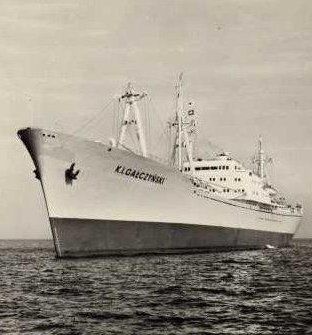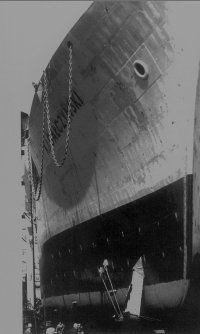Sail the oceans…

Countless crowd, head close to the head. Giant space decorated with flags. Flags were everywhere: on the cranes, on the water, on the ground. There was music coming from the giant speakers, along with some unrecognized words. On the dock there was a giant ship standing, secured by a line against going to the water. And the giant letters on the ship's side: M/s “K.I. Gałczyński”.
Below, but in the one third of the height of the ship, still above the crowd – large platform was mounted just before the prow. It contained countless reporters, microphones, cameras with flash lights. And — surrounded by officials, party members, bodyguards — the main actress of the ceremony — Natalia. Concentrated and deeply moved, she listens to the official speech by the second person in the country.
A sunny May afternoon of 1964. The great ceremony of launching the 10,000 GRT ship, M/s “K.I.Gałczyński”in the Szczecin[1] Shipyard. In the previous year, the Shipyard workers came with the initiative of celebration the 10th anniversary of death of the great poet. Although he didn't stay long in Szczecin. he still lives in the memory of many inhabitants of that beautiful city. That giant ship is going to be a small part of that memory…
That news, when reached Natalia, caused the great change in her life. It ended the years-lasting period of lethargy after Konstanty's death in 1953. She couldn't breakthrough that apathy, living like a snail in it's shell, feeling safe inside it. Yes, that happy news made almost all her psychic obstacles disappear, it was obvious and visible not only for me.
Natalia loved that beautiful city. She didn't have good memories, however; Konstanty's desease begun here. But all her later contacts with people living there were extremely open-hearted. One of the greatest admirers of that city was Staś Saliński, an old friend, best man of Konstanty in the marriage ceremony with Natalia. He came to Warsaw for a while and stayed for life. He always used to say that Szczecin reconciled him with Europe, which he truly disliked, that Szczecin is a port city on the European scale and in the future it will become of the worldwide importance. He was truly convinced that sea is the future of the world and he was able to pass his love to marine affairs to Natalia. Her sympathy to the city was constantly growing and some day she recognized it as her own.
After Konstanty's death she didn't like to return to most of the places where they used to live together. She was all against the idea of visiting Anin, however their friend from old Anin days, Zaruba, invited her so deeply. She never went to Nieborow, because, as she said, she was so happy there. In her words, nothing is able to give her back that happiness. I suggested her Masuria[2], which I discovered for myself in 1957 and where I used to escape every time I had it free. But she replied that she couldn't shake hand with the man living in Pranie now. I understood her rights, but suggested that we could go to Krzyże, the neighboring village, to Mr. and Ms. Popowski house. But then, with some tragic gloomy shadow in her eyes, she asked: “What would I do there without Kot?…”.
So I abandoned the Masuria idea, and tried another ones — Cracow, the place where she always used to come with great pleasure, for theatrical shows, meetings with numerous friends, and then — Zakopane[3]. And she accepted that, however — due to continuous progressing of her disease (I wasn't aware of that then, Natalia tried to avoid doctors like hell) — she was feeling worse. So Zakopane, that beautiful place in high Tatra mountains must have been neglected. Kazimierz still was available however and became more and more frequent stop in my car rides. Natalia always considered that beautiful, uncommon city on the bank of Vistula river, worthful for returns, however she didn't like the crowds, that could be found there all year long. With great pleasure she always used to return to the places by the Baltic sea — Ustron, Sopot, Rewal, Darłowo, and of course Gdańsk[4]. That city she always admired as well as writings of Thomas Mann, though, the city still held a lot of war-time scars at that time. Later, she discovered Bialystok region for herself, beautiful Supraśl hidden among the forests and in the end came Szczecin.
In December 1963 Natalia received first more important signal from that city. From that moment she was living only for that incoming Ceremony, great event in her life, mine and, above all, in the legend of Konstanty.
And finally came that beautiful day when the launching ceremony was about to begin. To Szczecin Natalia came with me and Stanisław “Dziadzia” Saliński, old friend and the sailor. The other person she mentioned, was Wojciech Siemion, a young actor whom she remembered from the Ateneum Theatre from Warsaw, and numerous poetic performances he gave later. She remembered his extraordinary skills for reciting the poetry of Gałczyński, in which he became unequalled. Natalia suggested him to the ceremony organizers to take part and that was no mistake. Siemion recited two poems — Przez świat idące wołanie [The Call Across the World] and Ojczyzna [Homeland]. However before actor and poet spoke their voices, some important events took place.
In the very last moment it was announced that Zenon Kliszko, second person in the country, will take part in the launching ceremony. That decision resulted in appropriate representation of local party leaders, as well as in large number of reporters and cameras of “Polska Kronika Filmowa” [The Polish Film Cronicle] and Polish Television.
In the case of coming The Cronicle to Szczecin I went to Karol Małcużyński[5], one of the leading figures in Polska Kronika Filmowa and asked him to provide one of the camera operator onn the Szczecin ceremony. He didn't promise anything, however he answered: “I think someone will come”. I didn't know then, that in fact he ment: “You'll have it as if in the swiss bank”.
Everybody could aks today what happened then, that on the launching ceremony of the commercial ship M/s “K.I. Gałczyński” suddenly such a high state/party-ranked person had appeared. Certainly that was not caused neither by the poet himself nor by his poetry. Zenon Kliszko preferred rather Cyprian Kamil Norwid[6].
As it became clear, either Norwid, or Gałczyński had nothing to do with that. After the speech of Kliszko, nobody didn't have even a slightest doubt, that his appearance was caused by the recent political reasons. In March, a group od Polish intellectualists wrote a letter to Prime Minister Cyrankiewicz, known later as “The Letter of 34” in regards of the continuous shortages if paper for publishing books and growing the censorship restrictions. Such an action was illegal in the communist Poland. The Letter caused a political turmoil and resulted with very harsh retaliatory actions to the signers. And that was the real reason Kliszko came to the launching ceremony in Szczecin — to give anothe hard speech comdemning The Letter.
- Szczecin, Wikipedia source.
- Masuria, Wikipedia source.
- Zakopane, Wikipedia source.
- Gdańsk, Wikipedia source.
- Karol Małcużyński [1922-1984]. Polish reporter on the Nuremberg Trial. One of the key redactors of Polska Kronika Filmowa [The Polish Film Cronicle]. In the seventies he hosted very popular TV program Monitor. Since 1976 he was a Member of Sejm, Polish Parliament. He was an opponent of the Martial Law declared in Poland in 1981. Brother of great pianist, Witold Małcużyński.
- Cyprian Kamil Norwid, Wikipedia source.
